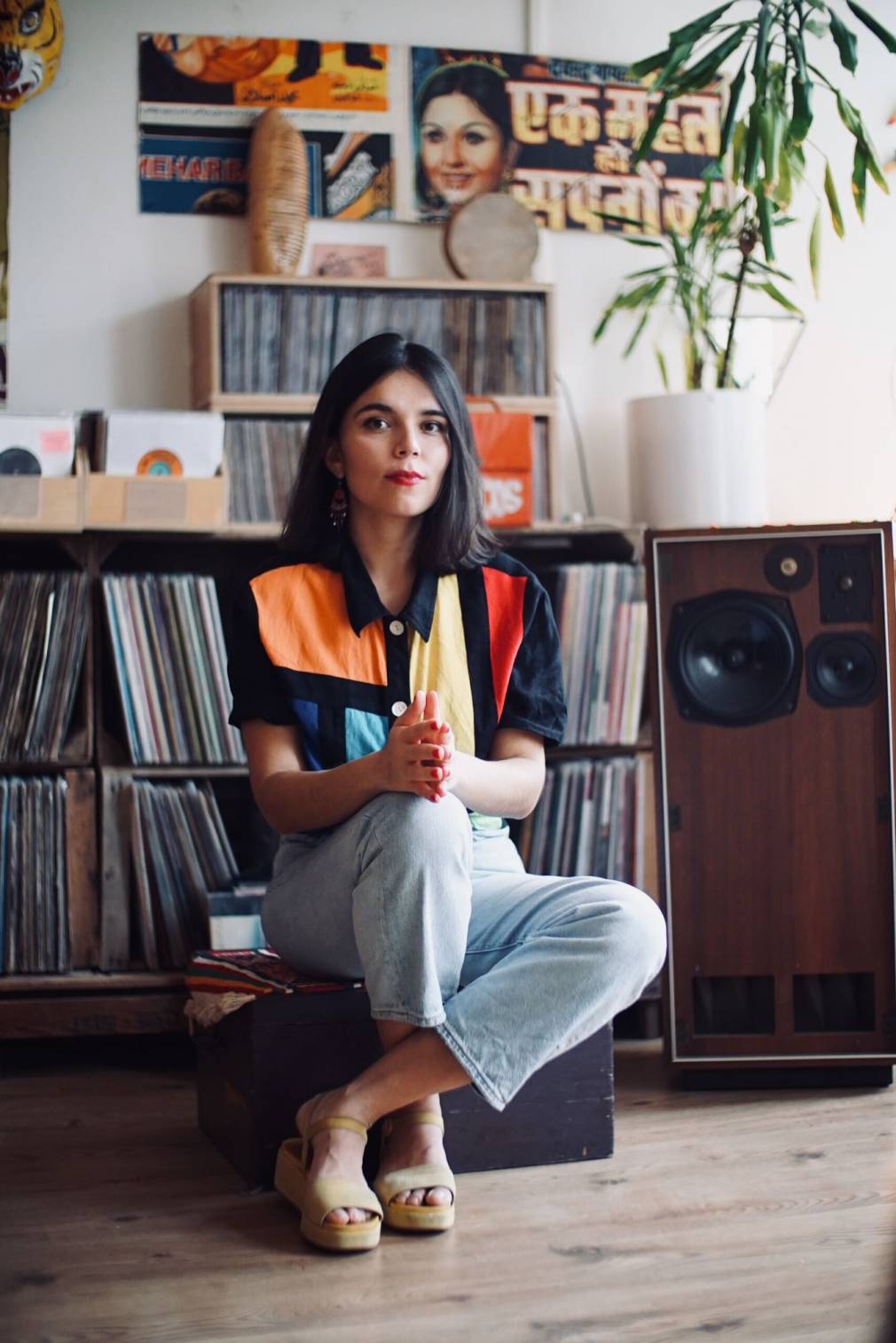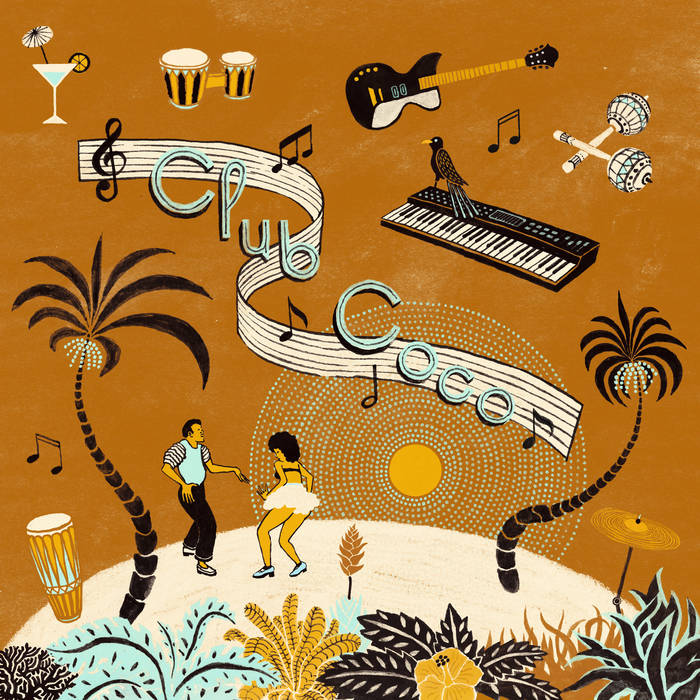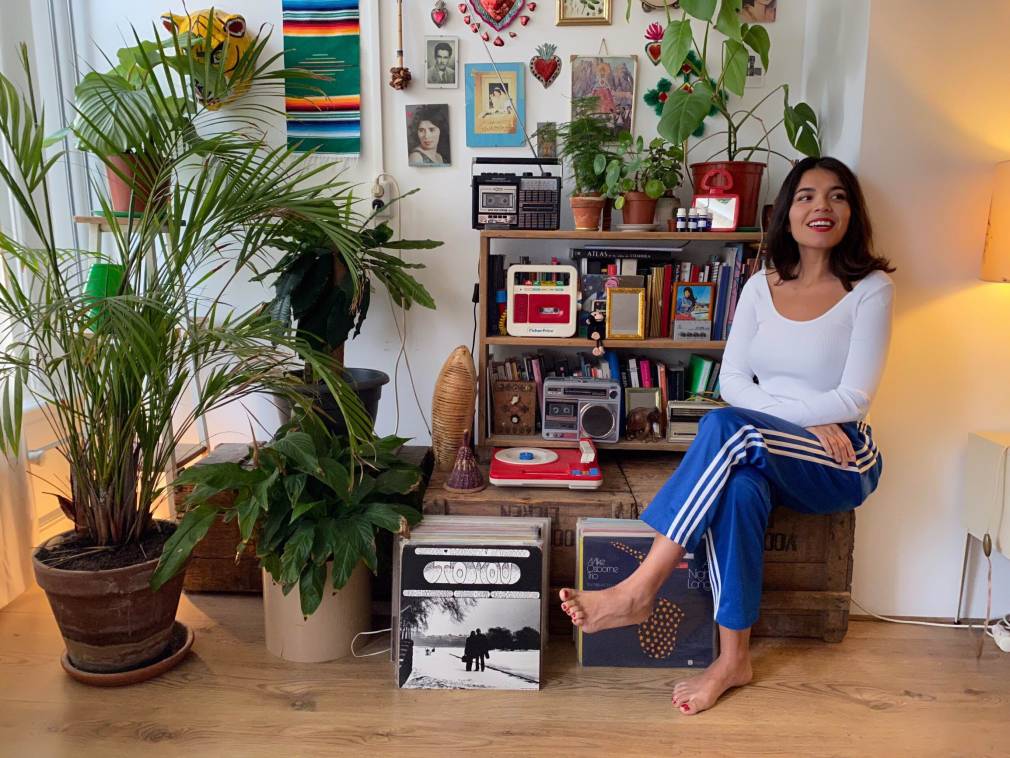Ana Lucia, better known as Coco Maria, is a Mexican DJ who has drawn on all kinds of influences on her travels and while moving between London and Berlin. Now settled in Amsterdam, she has hosted a show on the Worldwide FM radio station for the past two years, where she focuses on the African rhythms that lie embedded within Central and South American music. On her compilation Club Coco, Ana Lucia brings together various artists from Africa, Europe, America and Asia. She also sings, for the first time, alongside her choice of the best musicians inspired who produce resolutely contemporary music via vintage sounds. Get to know this unique DJ.
Can you tell us about your musical journey?
Music has always been a part of my life. I come from a very musical family and I have always appreciated the art form. My father, mother and grandparents bought a lot of records. From a very young age, I always had some money to buy music. My father is a musician, he sings, he plays the guitar, but he is also an engineer, so he never saw music as a job – it’s a hobby for him. He never took music seriously.
For me, there was a moment when I thought: “I don’t want to just listen to music, but to share it as much as possible with many people.” It was natural, I was living in London and all my friends there were musicians, and I was constantly accompanying them on tour! I learned a lot of things: booking, promotion … London is a perfect city to learn about the music business. Then I moved to Berlin and started to play in small bars. We had a band with some friends, I sang, played drums…
You have a show on Worldwide FM. Where does this desire to highlight music from around the world come from? What do you want to transmit through your shows?
Yes, I am very happy to be at Worldwide FM. I have admired their work since I was a child. At the beginning, I hosted a show once a month on Latin music, Afro-Latin music, Caribbean music, a bit of African music… Now, I do it every Wednesday, on whatever I want!
I opened up to a new audience with soul, psychedelic music, genres that I combine with Latin music. The first time I went to Europe, fifteen years ago, I felt that Latin America was only perceived through the prism of reggaeton or salsa. It is true that this is still very present, but there are also other rhythms. I want people to discover Latin funk, Latin soul, Latin jazz, influences from other countries…
I also like the show a lot because it is a morning show, so I try to choose music to start the day in a funny way, I want to transmit positive energy!
And where does your taste for African music come from?
Ever since I’ve lived in Europe I have seen from afar how African music has influenced Latin music. It has allowed me to reconnect with my roots. I have also traveled to Africa twice, to Senegal and Tunisia. I was amazed at the reception that Latin music got in that part of the world. I also work with Max, who runs a label in Ghana, and who introduced me to many artists, as did my other friends of African descent.

So it was Europe, rather than Mexico, that brought you closer to Africa?
Mexico is very big and, depending on where you live, the musical influences are different. I come from a place that is very close to the United States. The music we listen to there is mostly from the North, with no connection to African music. On the other hand, we listen to a lot of cumbia, a mixture of music from the indigenous populations of America, but also from Africa and Europe. Without knowing it, what I liked best in cumbia was the percussion, that is to say the African part of cumbia! In Europe, I also knew more people who were very attached to their African origins. I was not exposed to it before. I also didn’t have access to social networks and the ease that brings in connecting to the whole world. I was in a small, personal universe.
I think that in every place I’ve lived I have gained an interest in the different cultures of the people I’ve known. For example, in Amsterdam, the Indonesian and Surinamese cultures are very present. You wonder why, and then you start to understand the history, which can be sad and it’s the same in London. What can we learn from Jamaica? From India? From Ghana? In France, it’s mostly North Africans. I think it’s really thanks to my travels – all the places I’ve lived. These things have opened up my world.
Can you tell us about your Club Coco compilation? Who are the “best current bands,” to use your own words, that you intend to present on this new project?
(Laughs). In the last ten years there have been many compilations. Analog Africa has put out a lot of compilations and it helps to make music accessible to everyone, changing the way people perceive it. It’s mostly old music and it’s great that it still exists! But I was looking for current bands with organic music that are very clearly influenced by vintage and old sounds, while employing them in new projects. And there are plenty of them!
So I thought of this compilation to promote these bands. There is Malphino in London and, in regards to cumbia, there are musicians from Colombia, from London, from France, it’s like a party contained in a small object. When you open the record, there is a map of the world to show where all these groups come from: Mexico, Venezuela, Colombia, France, Reunion Island, the Netherlands, Japan, Indonesia, the Philippines, Ghana…
And you participate in some songs on the compilation?
“Ají de Malphino” is a cumbia song and in some places in Mexico, the population has the habit of talking over the music. For example, at a party, the DJ takes the MIC and says: “Hi Shehrazad, how are you?” People really like that! The DJ throws out greetings and so the band asked me to do that, it’s a very small collaboration (laughs).
And there is of course the song “Me Veo Volar,” which you sing on…
Regarding the title, it’s very important because it’s new for me, I never did anything like that before. Watching this whole process, it’s like the birth of a baby and it’s huge to me. For many years I defined myself as a DJ and through this song I discovered that there were other things I could do as well. I improvised the lyrics with a friend at a party. I sing about fear, which stops us from doing what we want to do, and the need to eradicate it from our minds to feel lighter and fly higher (laughs).
I’m still trying to apply this in my life. I started to realize that fear was holding me back much more than real external barriers. I remember times in my life that were difficult, like being in a new city, going through a breakup, not having money … For me, music has always been there. When I had a job that I didn’t like, I would listen to a song and then I would instantly feel better! I think music has that effect on a lot of people.
Not all the songs on the compilation are happy, but they allow the artists to express what they feel. There is also “Bomba Atomica” by the Meridian Brothers, a very joyful song whose lyrics are particularly strong for this moment, with the repression in Colombia. This song talks about how power structures use violence and fear to oppress citizens. It is a creative way to make people think about this situation. It is very important. And it’s universal.
Here in Amsterdam, life looks very nice, people drink their coffee in the street with little cakes, while in other places, all this is not possible. For me, the universality lies mainly in putting out a compilation that tries to bring hope, so that you don’t become pessimistic, despite the difficulties. I also think it’s universal because a lot of people feel the need to get together after the lockdown.
I saw that you hosted an online discussion about the impact of the health crisis on our mental health. How has it been for you?
I think many of us are going through the same thing. I’ve often felt stuck, especially after the summer, because I honestly thought it was going to go back to the way it was. I felt stuck, I felt hopeless about my projects, I didn’t want anything, I thought I was going to stop music altogether…
What helped me a lot was talking to other artists. I have a lot of engineer friends, but they don’t face the same problems. You have to talk to people who are going through the same things. Also, a DJ friend of mine, who lives in London, started the group “Artist Recovery Club.” It’s based on a book, The Artist’s Way: A Spiritual Path To Higher Creativity, by Julia Cameron, dedicated to all artists who feel stuck. We had weekly meetings, challenges, and lots of encouragement, and that helped us a lot.
The radio was also considerably beneficial, I had more time to select certain pieces of music, to prepare my show … The radio saved me. I was already doing radio before Covid, but it was secondary. Eventually, I realized that it was my passion.
Check out Coco Maria in our Songs of the Week playlist on Spotify and Deezer.
Pre-order the Club Coco compilation before May 28.




